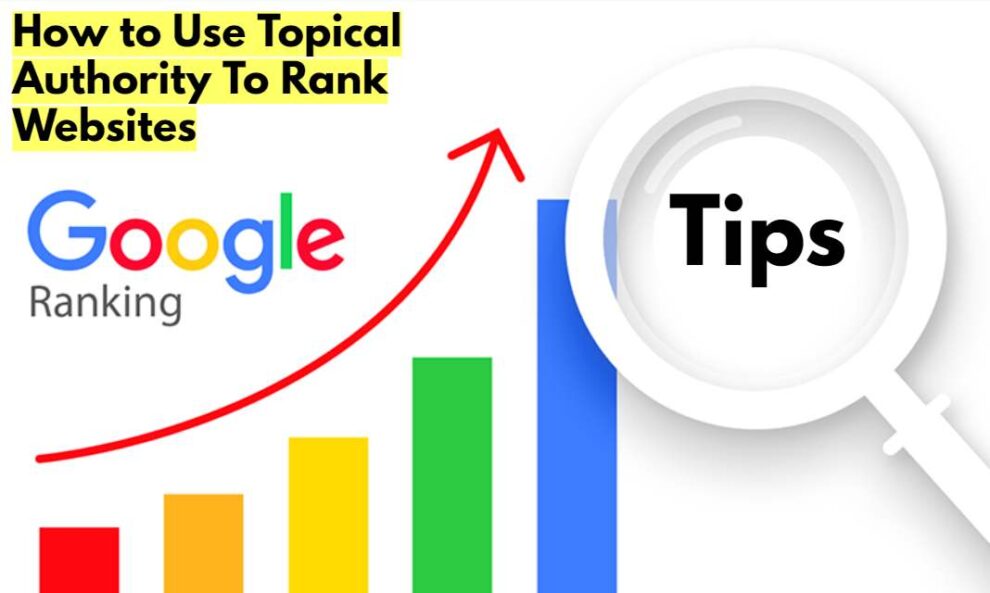Ranking websites is essential for businesses of all sizes. It can help you identify your target audience, establish your brand voice, and attract more visitors to your site. But ranking a website can be challenging. It can be time-consuming and frustrating. That’s where topical authority comes in.
A topical authority is an ability to rank well for specific keywords based on the topics you write about. With topical authority, you can rank for keywords that are relevant to your business. This post will give tips for using topical authority to rank your website. So read on and learn how topical authority can help you rank your website higher in the search engines.
What is Topical Authority, and how is it different from Domain Authority?
Topical Authority is a concept used in SEO (Search Engine Optimization) that refers to the authority a website has in a particular topic or niche. Topical Authority in SEO is based on the idea that the more authoritative a website is in a particular topic, the more likely it is to rank higher in search engine results pages (SERPs). Those websites are considered reliable sources of information in a particular subject area.
To build Topical Authority, a website must create high-quality content related to the topic and be updated regularly. This content should include relevant keywords and phrases and backlinks from other credible websites. Additionally, the website should be optimized for search engine algorithms to rank higher in SERPs.
Another way is to become involved in the community related to the topic. This could include participating in forums, blog commenting, and social media activities. This will help to demonstrate to the search engines that the website is an authority on the topic, as well as help to increase the website’s visibility and reach.
Finally, it helps when website owners are aware of their niche’s latest trends and developments, allowing them to create relevant and up-to-date content.
Overall, having Topical Authority is essential to any successful SEO strategy. Investing time and effort in building a website’s authority is crucial to ensure that it ranks well in SERPs.
Topical Authority Vs. Domain Authority
Topical Authority and Domain Authority are two important measures of the quality of a website and the metrics used to determine how well a website ranks in search engine results.
Topical Authority in SEO measures how well a website provides information about a specific topic. It is determined by analyzing the topics discussed on a website, the quality of content, the number of backlinks, and other factors. A website with high Topical Authority will likely offer comprehensive, authoritative information.
Domain Authority is a measure of the overall quality of a website, regardless of its topic. It is determined by a combination of factors such as the age of the domain, the number and quality of incoming links, the number of pages indexed by search engines, the amount of traffic to the website, and other factors. A website with high Domain Authority is likely to rank well in search engine results, regardless of the specific topic it covers.
Topical Authority and Domain Authority are important metrics for website owners and search engine optimization professionals. High scores in both areas can help boost a website’s search engine rankings and make it more visible to potential visitors.
Relevance of Building Topical Authority to Improve Site Rankings
Topical authority in SEO is an essential concept for improving site rankings. It is the concept of a website being an authority on a specific topic or set of topics, which gives it credibility and trustworthiness in the eyes of search engines. This credibility signals to the search engine that the website is an authoritative source of information on those topics and should be ranked higher in the search engine results.
Optimizing for topical authority involves creating content relevant to your target topics. This content should be high quality, focus intensely on your target topics, and be regularly updated. Having a well-defined content strategy is also important for optimizing topical authority. This involves determining your target topics and creating informative and engaging content.
Link building is another important factor in optimizing topical authority. This involves acquiring links from authoritative sources on the same or related topics from other websites. These links help build your website’s trustworthiness and show search engines that your website is an authority on the topics you are targeting.
Finally, you should also focus on user engagement when optimizing for topical authority. This involves creating interesting, engaging, and easy-to-understand content. Having a solid following on social media and a large number of subscribers to your website is also a good indicator of user engagement. It helps to show search engines that you are an authoritative source on the topics you are targeting.
Overall, topical authority is key in improving your website’s ranking in search results. By creating relevant content, obtaining relevant links, and engaging with your audience, you can demonstrate to SERPs that your website is an authoritative source of information on the topics you are targeting. This will increase your ranking in search engine results and help you reach more potential customers.
How does Topical Authority in SEO work?
A topical authority measures how much of an expert a website is on a particular topic. Search engines use topical authority to determine how to rank a website for specific searches related to that topic. Websites that demonstrate expertise on a topic are rewarded with higher rankings in search engine results. This is because search engines recognize that these websites have more relevant and valuable information to offer users about the topic.
To improve their topical authority in SEO, websites should feature content that is up-to-date, thorough, and of high quality. They should also use keywords related to their subject area and link to other authoritative sources to demonstrate their expertise. Additionally, they should actively engage in social media and other community platforms to create relationships with experts and other thought leaders in their field.
These tactics will improve a website’s overall authority on a particular topic and ultimately lead to higher rankings in search engine results.
Tips to follow to leverage Topical Authority to rank websites
Publish Quality Content
Creating quality content is critical to establishing topical authority. To ensure your content is of high quality, focus on creating well-researched, original, informative, comprehensive, and engaging content. Research relevant topics and write content that provides value to readers. Additionally, focus on optimizing your content to boost your content’s visibility in search engine results. Please spread the word about your content by actively promoting it across various social media channels. You can rank your website higher in search engine results by consistently publishing quality content and leveraging topical authority.
Optimize Content for SEO
Applying SEO best practices will help search engines easily find your content and rank it accordingly. Through keyword research and creating content that is highly relevant to a particular topic, topical authority can help websites rank higher in search engine results pages (SERPs). This can lead to a higher click-through rate and more organic traffic. Additionally, optimizing topical authority in SEO can build trust and credibility with Google and other search engines, increasing the chances of a website being indexed and ranking for relevant keywords.
Establish external and internal Links
Link building is one of the essential components for ranking a website. It helps to create relationships with other websites within the same niche. When search engines see that a website is connected to other authoritative websites within its topic area, it increases its credibility and relevance. It also increases the exposure of the website to new search terms and users, which can help to improve its ranking. By leveraging the authority of other websites within the same topic, link building can boost a website’s SEO and help it rank higher on search engine results pages.
Utilize Social Media
Social media is an excellent tool for building topical authority for websites. By engaging in conversations about topics related to the website, creating content relevant to the website’s focus, and interacting with other website owners, influencers, and industry leaders, website owners can demonstrate their knowledge and expertise in their particular field. Additionally, social media can drive organic traffic to the website, which can positively affect rankings. Social media engagement helps build relationships with others in the industry, leading to backlinks, citations, and other forms of recognition. All of these aspects can contribute to improving website rankings, thus leveraging topical authority.
Monitor Your Progress
Monitoring a website’s process is incredibly useful in leveraging topical authority to improve rankings because it can help identify areas of a website that can be optimized to ensure that it provides the best possible content for users and search engines. By monitoring website processes, website owners can better understand how their content is being indexed and ranked by search engines and make changes to content and website structure to ensure they take full advantage of topical authority. You can track your website’s progress by analyzing your website’s ranking in the SERPs and utilizing tools such as Google Analytics to monitor your website’s performance.
Utilize keywords effectively
Using keywords strategically ensures that search engines can adequately identify and rank your website about a particular topic or query. Keywords also help improve your website’s visibility, as they are the words and phrases people commonly use in searches. By strategically targeting relevant keywords and phrases, you can ensure that your website is more likely to appear in inquiries related to your topic. Additionally, optimizing your content with relevant keywords helps draw in more relevant visitors to your website, leading to increased engagement and conversions.
Publish regularly
Consistency is vital when it comes to SEO rankings.
- Regularly publishing content ensures that search engines can discover and identify the website’s content. By consistently updating with new and relevant content, the website will become more visible in search results, as the search engine bots will crawl the website more frequently.
- By publishing content regularly, the website will gain more domain authority, as the search engine bots will recognize the website as an authoritative source on a given topic. This will result in higher rankings for the website when people search for terms related to the topic.
- Regular content updates demonstrate credibility and trustworthiness to search engine bots, resulting in a better overall ranking. Regularly publishing content will help the website rank higher in search engine results by building and using topical authority.
Optimize for voice search
With the rise of voice-activated search, optimizing your content for voice search is important. This means using natural language and long-tail keywords in your content. It not only provides more relevant search results but also improves user experience. Search engines can better understand the context of a query and the related topics, allowing them to better match the user’s search intent with the most relevant results. This can result in higher rankings as search engines reward sites that provide the most relevant and valuable content. Voice search can be faster and more intuitive than typing, making it easier for users to find what they’re looking for and providing a better overall user experience. This can result in higher organic traffic and improved rankings.
Optimize content for sharing
Using topical authority through optimizing the content’s shareability can help improve a site’s ranking in various ways.
- It increases the likelihood of the content being seen, shared, and engaged with and provides an additional source of backlinks from authoritative websites.
- It can help build a solid social presence for the website, which can also positively impact its visibility in search engine results.
- It can boost organic traffic to the website and develop brand awareness and loyalty.
Therefore, these are a few valuable and proven tips for using topical authority in SEO to improve site rankings effectively. With that said, below is a roadmap to building topical authority. Knowing this might help improve your site’s ranking and overall site performance and earnings in better ways.
Roadmap to build Topical Authority
Building topical authority requires a focused effort and commitment to publishing relevant and authoritative content in its topic or field. The following steps provide a roadmap for creating a strong foundation for topical authority in SEO:
- Identify Your Area of Expertise – Before starting to build topical authority, you need to identify the area or field you want to focus on. This could be an industry-specific topic, a niche subject, or an area of broader interest.
- Develop an Editorial Strategy – Once you have identified your area of expertise, you need to develop an editorial strategy for content creation. This should include deciding on the topics you will cover, the content’s format, and the publishing frequency.
- Create Quality Content – Producing relevant content is vital to building topical authority. The content should be informative and engaging and provide value to readers.
- Promote Your Content – Once you have created content, it is important to promote it to reach potential readers who may have yet to find it organically. You can do this through social media, email campaigns, and other marketing strategies.
- Engage with Your Audience – Engaging with your audience is another key part of building topical authority. This could include responding to comments, participating in discussions on related topics, and networking with other professionals in the same field.
- Monitor and Measure Your Progress – It is important to monitor and measure your progress in building topical authority. This will allow you to track the impact of your efforts and make adjustments as needed.
By following these steps and committing to a focused effort, you can build topical authority and create a strong foundation for your content.
Conclusion
Building topical authority in SEO is important because it allows businesses to establish their credibility and expertise in a particular area of knowledge. It is also essential for improving rankings in search engine results, as search engines favor sites that provide content related to a specific topic. This increased visibility can drive more traffic and customers to the business, ultimately leading to increased revenue. Additionally, having a strong topical authority can help to build trust with potential customers and make them more likely to purchase products or services.
When people google a topic, they are likely to click on the first website that pops up. This is why it is essential to use topical authority to rank your website.



















Add Comment